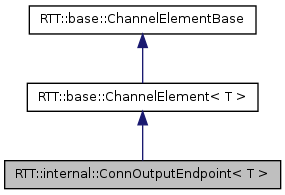#include <ConnOutputEndPoint.hpp>

Public Member Functions | |
| ConnOutputEndpoint (InputPort< T > *port, ConnID *output_id) | |
| virtual bool | data_sample (typename base::ChannelElement< T >::param_t sample) |
| virtual void | disconnect (bool forward) |
| virtual base::PortInterface * | getPort () const |
| bool | inputReady () |
| virtual bool | signal () |
| virtual bool | write (typename base::ChannelElement< T >::param_t sample) |
| ~ConnOutputEndpoint () | |
Private Attributes | |
| ConnID * | cid |
| InputPort< T > * | port |
Detailed Description
template<typename T>
class RTT::internal::ConnOutputEndpoint< T >
This is a channel element that represents the output endpoint of a connection, i.e. the part that is connected to the InputPort. In the RTT, connections are always created from input towards output. So this class is typically first created of the channel element chain and attached to the input port. Then we build further towards the outputport. Imagine a spider attaching a thread at one wall and moving along to the other side of the wall.
Definition at line 57 of file ConnOutputEndPoint.hpp.
Constructor & Destructor Documentation
| RTT::internal::ConnOutputEndpoint< T >::ConnOutputEndpoint | ( | InputPort< T > * | port, |
| ConnID * | output_id | ||
| ) | [inline] |
Creates the connection end that represents the output and attach it to the input.
- Parameters:
-
port The start point. output_id Each connection must be identified by an ID that represents the other end. This id is passed to the input port port.
- Returns:
Definition at line 70 of file ConnOutputEndPoint.hpp.
| RTT::internal::ConnOutputEndpoint< T >::~ConnOutputEndpoint | ( | ) | [inline] |
Definition at line 76 of file ConnOutputEndPoint.hpp.
Member Function Documentation
| virtual bool RTT::internal::ConnOutputEndpoint< T >::data_sample | ( | typename base::ChannelElement< T >::param_t | sample | ) | [inline, virtual] |
Definition at line 128 of file ConnOutputEndPoint.hpp.
| virtual void RTT::internal::ConnOutputEndpoint< T >::disconnect | ( | bool | forward | ) | [inline, virtual] |
Performs a disconnection of this channel's endpoints. If forward is true, then the disconnection is initiated by the input endpoint. Otherwise, it has been initiated by the output endpoint.
Reimplemented from RTT::base::ChannelElementBase.
Definition at line 102 of file ConnOutputEndPoint.hpp.
| virtual base::PortInterface* RTT::internal::ConnOutputEndpoint< T >::getPort | ( | ) | const [inline, virtual] |
Gets the port this channel element is connected to.
- Returns:
- null if no port is connected to this element, the port (or a proxy representing the port) otherwise.
Reimplemented from RTT::base::ChannelElementBase.
Definition at line 133 of file ConnOutputEndPoint.hpp.
| bool RTT::internal::ConnOutputEndpoint< T >::inputReady | ( | ) | [inline, virtual] |
Called by the connection factory to check that the connection is properly set up. It is called when the channel is complete, so we can register ourselves on the port side now
Before that, the channel might not be complete and therefore having the input port read on it would lead to crashes
Reimplemented from RTT::base::ChannelElementBase.
Definition at line 87 of file ConnOutputEndPoint.hpp.
| virtual bool RTT::internal::ConnOutputEndpoint< T >::signal | ( | ) | [inline, virtual] |
Signals that there is new data available on this channel By default, the channel element forwards the call to its output
- Returns:
- false if an error occured that requires the channel to be invalidated. In no ways it indicates that the sample has been received by the other side of the channel.
Reimplemented from RTT::base::ChannelElementBase.
Definition at line 115 of file ConnOutputEndPoint.hpp.
| virtual bool RTT::internal::ConnOutputEndpoint< T >::write | ( | typename base::ChannelElement< T >::param_t | sample | ) | [inline, virtual] |
Writes a new sample on this connection This should never be called, as all connections are supposed to have a data storage element
Definition at line 99 of file ConnOutputEndPoint.hpp.
Member Data Documentation
ConnID* RTT::internal::ConnOutputEndpoint< T >::cid [private] |
Definition at line 60 of file ConnOutputEndPoint.hpp.
InputPort<T>* RTT::internal::ConnOutputEndpoint< T >::port [private] |
Definition at line 59 of file ConnOutputEndPoint.hpp.
The documentation for this class was generated from the following file: